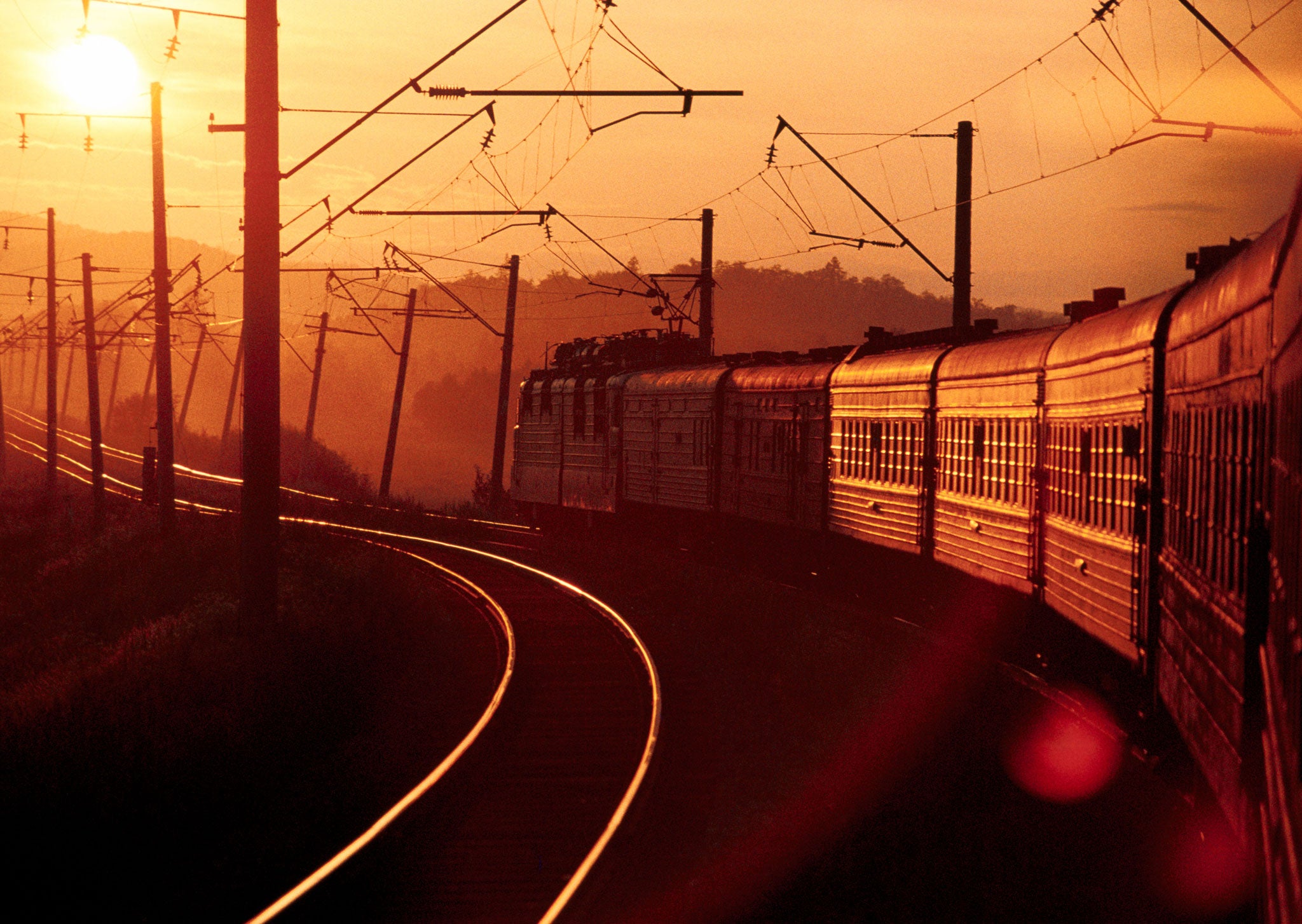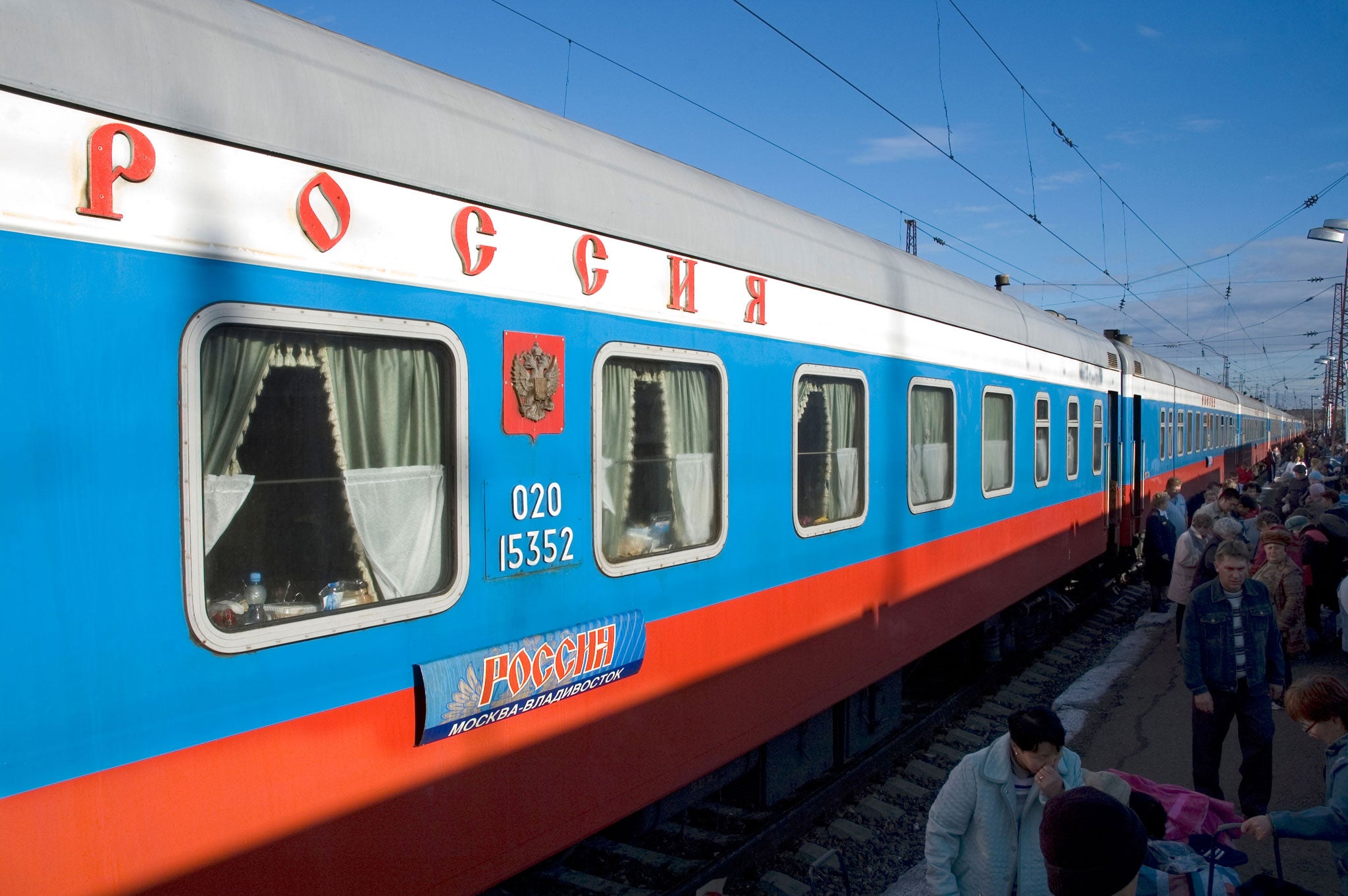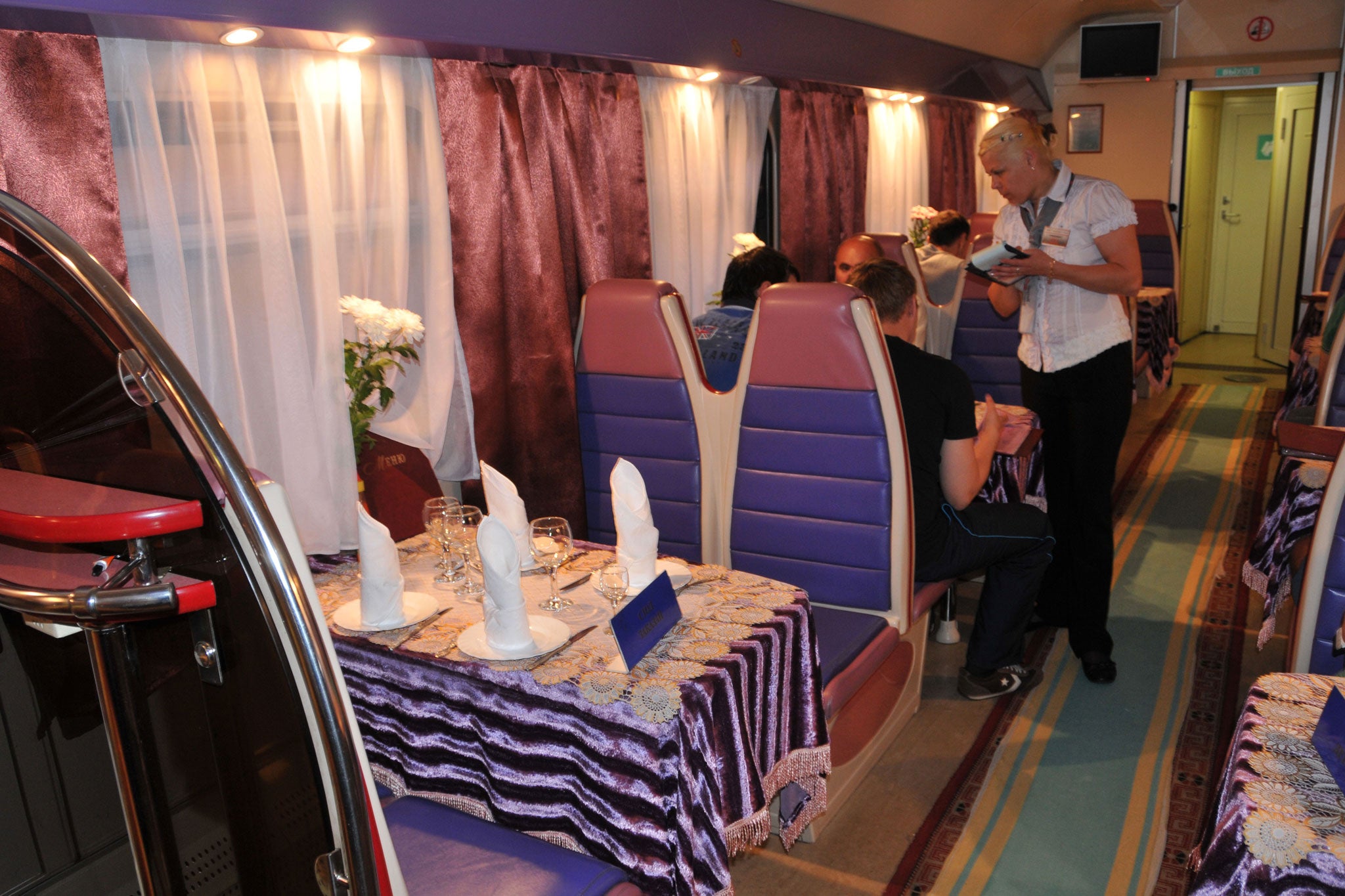Travel special 2014: Think you know the Trans-Siberian Railway? Think again...
It's probably the tourist-friendly version that winds up in Beijing. As opposed to this one, which takes in 6,000 miles of desolate Siberian tundra, seven time zones – and drives a man to live off packaged noodles

There are two main routes on the Trans-Siberian Railway. The famous one – the one that people are usually talking about when they say they've done the journey – runs through Siberia only as far as the town of Ulan-Ude. From there it trickles south, into the changing landscapes of Mongolia and through the Gobi desert, before terminating in Beijing.
The other one passes through 6,000 miles of unbroken Siberian tundra, all the way from Moscow to Vladivostok. Very few tourists attempt this latter route. It crosses seven time zones and takes an entire week. Everyone I met in Moscow said I was mad to be doing it. When I told them I was retracing the journey of a famous English novelist, they said she must have been mad, too.
Angela Carter – whose biography I'm writing – travelled on the Trans-Siberian Railway in 1971. It was a fairly different experience in those days. The USSR was going through a period of economic expansion, and the trains still retained something of their old Imperial elegance. Lace curtains allowed a bit of privacy into cabins that had only two berths each; in the dining car the waiters wore black tie, and served Georgian champagne.
Carter wasn't mad: she was a born romantic, and the atmosphere of faded grandeur was kind to her imagination. "It is possible," she wrote, "as one sips one's Chekhovian glass of tea and lights a cigarette of the suavest Turkish tobacco, to believe that [the Trans- Siberian Railway] offers an elegiac remembrancer of the kind of luxury that departed our lifestyle when the lights went out over Europe."
That wouldn't be an easy case to make today. I had plenty of time over the course of my journey to dwell on the luxuries I'd left behind: a soft mattress, hot running water, toilets that could cope with toilet paper...
In the third-class dormitory compartment that I'd booked myself into, six berths (each half the width of a normal single bed) were slotted, like so many shelves, into a space about the size of a horsebox. The unluckiest passengers had to sleep five or six feet above the ground, their noses only inches from the ceiling. Body-heat curdled the air. There were no showers on board. The stench of sweat was overwhelming.
My fellow passengers were mostly young men travelling across Russia for work. They gathered around noisy radios in the evenings, and became argumentative, then exuberant, and finally comatose on vodka. Our attempts at conversation were hindered by their drunkenness and my poor language skills. Nightly, one of them would approach me and slur some question; I would say, in faltering Russian, that I didn't understand; and he would say the same thing again – only louder.
Other than reading, my main recreation was to stand in the corridor of the first- and second-class carriages with my face pressed up against the window. Outside, an almost featureless white landscape trundled by: huge expanses of snow, broken only by leafless black trees, black frozen lakes, and every two or three hundred miles a few brightly painted wooden buildings, huddled together as if for warmth. In every direction, these desolate views extended to the horizon.

Life on the railway has a groggy, dreamlike quality. The train chugs along at an unvarying speed of 50mph. Because of the constantly shifting time zones, each day is shorter than the last. I found myself nodding off to sleep in the middle of the afternoon, then tossing and turning for half the night. It was like having jetlag, but jetlag stretched thin over the course of a week.
I spent hours each day in the restaurant car, where thickly made-up waitresses added smoke from their cigarettes to the reek of frying fat. From the inscrutable menu, I chose at random and was presented with a stomach-turning array of knotty meats and fatty stews, garnished with bitter herbs and, often, a human hair or two. After three or four unfinished meals, I decided I could probably survive on instant noodles (purchased from the attendants in each carriage and cooked with water from the samovar) and the slabs of pungent dried fish sold from hooks on station platforms.
It wasn't long before I cracked, and paid to be upgraded to first class. That didn't mean much in terms of luxury (there still weren't any showers; the toilets still rejected paper), but it was a great improvement in terms of privacy. The first-class compartments fit just two berths into the same space as the third-class compartments squeeze six.
My new travelling companion was an elderly woman (the Russians have a startling indifference to gender divisions) who wore the same pink tracksuit for the entire journey, and rarely left her berth. There was a small television above the doorway of our cabin, and she spent most of each day watching terrible-looking films at a deafening volume: they all seemed to contain long musical interludes, during which the characters chased one another around at an incredible speed, like in a Benny Hill skit.
The old lady and I managed a couple of basic, stumbling conversations ("Where are you going? Where are you from?"). We shared a bit of dried fish. One morning I awoke, having kicked the sheets off in my sleep, to find her tucking me back in.
Somewhere around the fourth day, an English couple joined the train. I greeted them with such eagerness it's a wonder they didn't take fright; when I started talking, my voice sounded strange from lack of use.
They told me they'd come all the way from Huddersfield by train, and were going to visit their son in Seoul, where he worked as an English teacher. Sensibly, they had broken their journey up into several short bursts, stopping for at least a night or two between each one. (Note to anyone considering this route: go with somebody else, and stop as many times as you can along the way. The couple from Huddersfield were having a much better time of it than I was.)

My own first stop, after five nights, was Khabarovsk, a city of half a million people about 20 miles from the Chinese border. I was looking forward to reaching my hotel – hot running water, internet access, a laundry service – but I had trouble checking in. There was a six-day gap in my registration documents, which I explained was down to the six days I'd just spent on the train. I smiled at the receptionist: "Is that going to be a problem?"
She didn't smile back. "Yes."
Grudgingly, and after lengthy debate, she said that I could leave my bags at the hotel while she tried to work it out. In the meantime, I decided to have a look around.
During the summer months, Khabarovsk must be a nice enough town. Beer tents are erected down the lamp-strung promenade that runs for several miles along the banks of the Amur River, and there's an attractive city beach. But during the winter the vast river is frozen solid, and a bitter wind blows off it. I passed only a few scattered people as I made my way along the promenade: a gang of leather-clad young men, loitering by a deserted dodgem stand; a couple of middle-aged drunks, snoring in each other's arms. It felt like a city on the edge of the world.
I went back to my hotel and (my registration having been completed) tried to Skype my wife. I'd been storing up things to say to her for days, but the connection was poor – the screen kept freezing, as if the pixels were affected by the temperature outside – and after a few frustrating minutes it failed completely. I lay down on the bed, and within moments, still wearing my walking boots and thermal jacket, I was asleep.
The train to Vladivostok the next day was more comfortable than the one from Moscow had been. My cabin was no bigger than the one I'd shared with the old lady, but this time I had it to myself. The attendant had placed a vase of flowers on the table between the berths. This final leg of the journey lasted a mere 12 hours: I could manage without toilet paper or a shower for that long.
I felt I was getting the hang of things by now. I'd packed a feast of dried fruit, nuts and chocolate bars, so there was no need to visit the restaurant car except for a change of scene. I lay on my berth, the window directly above my head, and gazed up at the massive, pale Siberian sky. Since leaving Moscow I had crossed nearly a quarter of the Earth's circumference: it was a dizzying thing to contemplate. As it grew dark outside my cabin, I was filled with respect for the sheer unlikeliness of these trains, shouldering their way out across the wilderness, bridging unthinkable distances, carrying generations of travellers into the unknown. I felt suddenly very privileged to have experienced them.
All the same, it was good to know that I'd be going home by plane.
Join our commenting forum
Join thought-provoking conversations, follow other Independent readers and see their replies
Comments
Bookmark popover
Removed from bookmarks